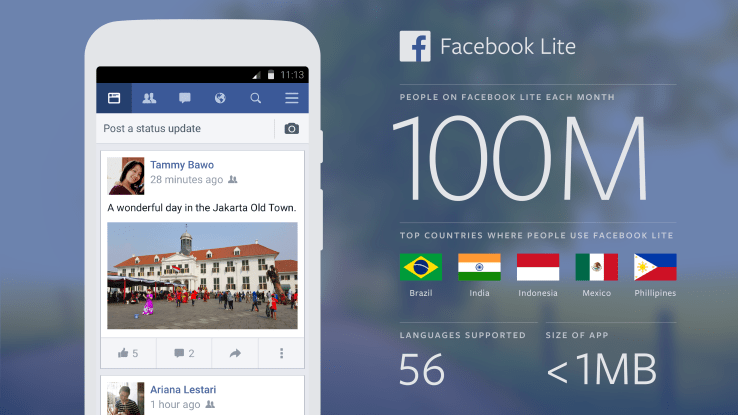
Facebook Lite, Facebook stripped down version of its service for Android, just past the notable landmark of 100 million monthly active users and became the social network’s fastest growing mobile app.
The app, which is designed for emerging market users who may have low-cost smartphones and poor quality Internet connections, has reached the 100 million milestone just nine months after its launch in June — that’s quicker than Facebook’s main mobile app, and any others. Facebook said it is most popular in Brazil, India, Indonesia, Mexico, and the Philippines, but it is available in 150 countries.
The app is just 1MB in size to enable a quick download and help save on available memory. That made its functionality fairly basic, but now Facebook is sprucing things up with the addition of a number of new features, including support for video, multiple photo uploads, pinch-to-zoom for photos, and emojis.
We asked Facebook whether it has plans to launch a similar app for iOS or other platforms, but the company didn’t reply. The company did say that users can see “some ads” on Facebook Lite. At this point, the Facebook Lite users represents a small part of the social network’s 1.59 billion active userbase but, as it continues to grow at a rapid pace, the company may want to fine tune its advertising strategy for the app.
Shrinking a social network down to a 1MB app is no easy task, and Facebook went into detail on how it achieved that feat in a blog post that’ll be of interest to any companies that operate in emerging markets.
Of all the U.S. companies, Facebook is one of the most attuned to emerging markets.
It has employees stationed worldwide and it also regularly sends staff to emerging markets to sample the conditions that its services must work with. Last year, the company introduced ‘2G Tuesdays’ to help U.S.-based employees sample emerging market conditions for themselves.
Facebook also runs its Free Basics service, formerly known as Internet.org, which helps connect ‘the next billion’ by offering a selection of web services for free. The service is controversial because Facebook hand selects the service that users can see, and led India to block it on the grounds that it violates the principles of net neutrality.


Comments are closed.